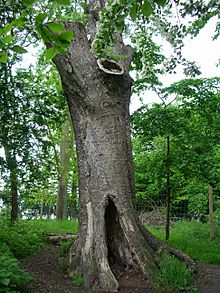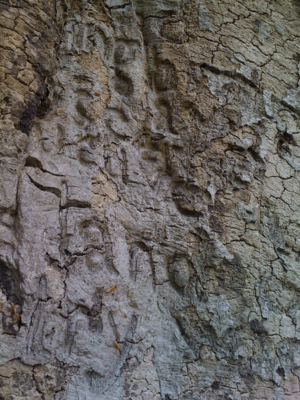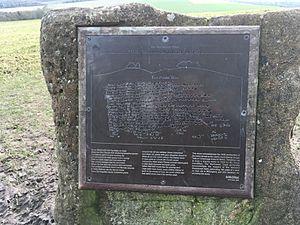The Poem Tree facts for kids
Quick facts for kids The Poem Tree |
|
|---|---|
 |
|
| Artist | Joseph Tubb |
| Year | 1844/45 |
| Type | Beech tree carving |
| Location | Wittenham Clumps, Oxfordshire, UK |
| 51°37′41.66″N 1°10′42.89″W / 51.6282389°N 1.1785806°W | |
| Owner | Earth Trust |
The Poem Tree was a special beech tree located on Castle Hill at Wittenham Clumps in Oxfordshire, England. What made it unique was a long poem carved into its trunk by a man named Joseph Tubb. The tree was very old, about 300 years, when Tubb carved his poem in the 1840s.
Sadly, the tree started to die in the 1990s. It slowly rotted away while still standing. In July 2012, during a period of very bad weather, the old tree finally fell down. To remember the tree and its poem, a stone with the poem copied onto it was placed nearby in 1994. This was 150 years after the poem was first carved.
How the Poem Was Carved
Joseph Tubb spent two weeks carving his 20-line poem into the tree. This happened during the summer. He brought a ladder and even a tent to the beech tree. Tubb carved the poem from his memory, sometimes forgetting to bring his written copy with him. It's thought he did the carving either in 1844 or between 1844 and 1845.
The Poem's Words
The poem carved into the tree tells a story about the land around Wittenham Clumps. It talks about history, from ancient times to Roman power and even Vikings. It also mentions the River Thames. The poem is a way to look back at the many changes the area has seen over hundreds of years.
As up the hill with labr'ing steps we tread
Where the twin Clumps their sheltering branches spread
The summit gain'd at ease reclining lay
And all around the wide spread scene survey
Point out each object and instructive tell
The various changes that the land befell
Where the low bank the country wide surrounds
That ancient earthwork form'd old Mercia's bounds
In misty distance see the barrow heave
There lies forgotten lonely Cwichelm's grave.
Around this hill the ruthless Danes intrenched
And these fair plains with gory slaughter drench'd
While at our feet where stands that stately tower
In days gone by up rose the Roman power
And yonder, there where Thames smooth waters glide
In later days appeared monastic pride.
Within that field where lies the grazing herd
Huge walls were found, some coffins disinter'd
Such is the course of time, the wreck which fate
And awful doom award the earthly great.
The Poem Tree's Legacy
Over time, the tree grew, and the carved letters became harder to read. In 1965, a geographer from the United Kingdom named Henry Osmaston made a special copy of the poem. He did this by making a "rubbing" of the carving before it became too faded.
As the tree got older, its health declined. It died in the early 1990s. By the time it fell in 2012, the poem was very difficult to see. The tree's growth had stretched and changed the few letters that were still visible.
In 1994, a special stone and plaque were put near where the tree stood. This was to celebrate 150 years since the poem was carved. The plaque has a copy of Osmaston's 1965 rubbing, so people can still read the poem. It is attached to a large Sarsen stone.
After the tree fell, a crane was used to make the area safe. However, the old, rotted trunk broke apart even more. A few days later, someone left flowers on the shattered remains of the tree. The parts of the tree have been left where they fell. They now provide a natural home for plants and animals.
 | John T. Biggers |
 | Thomas Blackshear |
 | Mark Bradford |
 | Beverly Buchanan |



